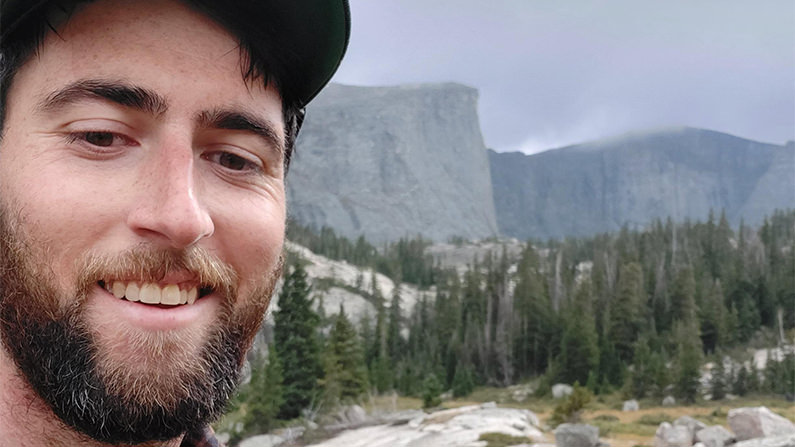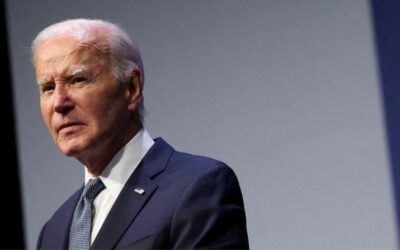“Truly Wyoming’s loss” and “We are in your debt” were just some of the comments posted on Twitter last week in response to the news that Nick Reynolds is leaving the Cowboy State. Reynolds has reported on Wyoming politics for the past three years, first for the Casper Star-Tribune and then WyoFile, and he was often one of the only reporters at the Wyoming State Legislature. KHOL News Director Kyle Mackie interviewed Reynolds about the difficulty of making a living in local news in Wyoming and his new role in South Carolina.
The following interview transcript and audio has been edited for clarity and brevity.
KYLE MACKIE: Nick, I want to start as a fellow journalist just by thanking you for your nuanced and thorough coverage of politics and policy in Wyoming over the past three years. I’ve only been here for a little less than a year, but I—like so many other readers—have come to really rely on your coverage. A lot of us are really going to miss you. You also wrote this beautiful but also sad essay last week about your decision to leave Wyoming and what’s next for you. I wonder if you could give us a little recap of that of that column?
NICK REYNOLDS: Yeah, I guess I kind of made a habit of doing those over the last couple of years. I don’t know, the way I approach my beat… like I always thought, you know, journalism was always, like, this human thing. Some reporters always like to keep their sources at an arm’s distance and, you know, to some degree I definitely do that. Professionally, you have to be able to draw that line at some point, but to say that [I did] journalism [in Wyoming] for three years and not building relationships—I just can’t do my job that way. I can’t function that way. And I have got a lot of close relationships with people, and things were moving so quickly. You know, I’ve had messages I still haven’t gotten back to from people wishing me well or asking what the deal was, and I kind of just figured, you know, I should put something out there to acknowledge why I was leaving. And it was solely for professional reasons.
I feel really strongly about Wyoming, and I do feel really invested in the state’s future as well. Covering the issues for a while, you can present them in a really unbiased way but I have been concerned about the future for people who want to stay in the state or, you know, people who don’t have opportunities here. I’ve been hearing those stories for years, and while I was privileged enough to go to a publication like WyoFile, which was able to pay a lot more than the Casper Star-Tribune or another smaller publication, that’s not the story for everyone. Some people who want to stay don’t have a choice, and they’ve had to leave the state when they didn’t want to or they wanted to make a life here. Or, you know, they hold on just long enough until one of the handfuls of jobs working at a nonprofit opens up. And it’s a difficult state to make it in. And I guess when reporters leave, you don’t really get the story of why. But oftentimes I know that’s the case, and with the platform I have and the relationships I have built, I felt it was important for people to know exactly what the reality was on the ground here.
MACKIE: Yeah, that’s one of the things I really appreciated about your farewell column is that you really call out the challenges of making it, making a living as a local reporter in Wyoming. This is something, of course, our staff here at KHOL is aware of and then living with. But you’ve served statewide as the president of the Casper Star-Tribune’s union and also on the board of the Society of Professional Journalists in Wyoming. So, from that statewide perspective, I’d love to hear from you just about the challenges you see in this industry in the state.
REYNOLDS: Well, typically, I guess the organizations that have been successful in keeping people industry-wide are typically the ones that have either been under independent ownership or have been unionized. And I think that was a strong push behind the unionization that happened at the Casper Star-Tribune. It happened before I got there. The person chairing that was actually my predecessor… and after he left, I sort of stepped into that [role] right before we were about to sign our first contract. I believe we were actually in the process of negotiating our first contract when I got there. And you know, people think a lot of times it’s out of it was dissatisfaction with their workplace [that workers unionize], and in some cases that’s true, but I think a lot of people saw it as ensuring the vitality of an organization, especially when you’re under corporate ownership. You know, publicly traded companies are required by law to promise a return to their investors. And if there’s no stalwart against that, there’s nothing to stop them from cutting, capping wages or cutting positions in ways that might actually impact their bottom line down the road, really. So, I think that was, I mean, just talking to union reps around the country, you know, that’s kind of the similar push for them is just to make sure that the products that they dedicate a huge chunk of their lives to—their entire lives to, in fact—aren’t pulled out from under them and caused to be unviable that way.
But you know, we also see an instance where a lot of publications that are smaller and may not be corporate owned are also facing issues. I mean, you know, Adams Publishing Group plays a huge role in the state, and it’s been well-documented by the union in Cheyenne what they’ve done with their publications. They haven’t been giving their workers full work weeks for over a year. You know, our publication [Casper Star-Tribune] has been capping, has been decreasing the top wages for years. I remember when I started, I was making the fifth most in the newsroom at $35,000, and now I don’t think anyone is making more than $34,000. And that’s a three-year difference. But a lot of these other smaller publications, you know, the reality is that there’s only a certain amount of ad revenue out there and so few paying subscribers that really what seems to be holding these publications together is the goodwill of the community to keep buying print advertisements and a couple of oil grannies who still buy the print edition every week. And you know, that’s not a sustainable operation for anyone.
There have been some organizations that have managed to, I guess, get out of that cycle. Senator Dan Dockstader’s organization out in Star Valley is actually one of the ones that’s actually managed to branch out in a way, but a lot of the other publications in the state are—they’re not cash cows. Oftentimes, they don’t pay wages that are really competitive with the rest of the industry. I mean, one, you’re convincing people to move out to rural Wyoming, which is already a pretty difficult place to make it. I mean, it’s beautiful. It’d be a privilege to make it out there. But if you’re not making big bucks, it’s difficult to find housing. And probably difficult to find a second opportunity if you wanted to supplement your income, and just the wages are unsustainable. I mean, if you want to leave, you’re going to have to save up quite a bit of money. Moving to South Carolina cost me several thousand dollars. It came very close to tapping out my savings to make that happen. We just got to think about, you know, the financial realities for a lot of people and they’re not good.
MACKIE: Yeah, I mean, I can certainly speak to the wide prevalence of those low salaries, like $35,000 for an entry-level reporter—and not even entry-level. You know, mid-career people with way more experience often at these smaller publications are still not making a livable wage. And that is tough. That is tough to live on and this is a tough industry to work in as well. So, I appreciated your callout, too, at the end of the column, asking people to pay for their news, and I will echo that with you. Please pay for your news.
REYNOLDS: Yeah, even if it’s not a subscription model. There’s no other way to do it. There’s only so many foundations out there that are giving money to nonprofits, and they’re all competing for the same pot of money. You can only tap one demographic so much, so even that that nonprofit model, while I think it’s the future in a lot of ways, it’s definitely not sustainable.
MACKIE: Right. Well, so you touched on this a bit, but you reflected in your column about the love that you’ve developed for the state, for its people. And if I may, I want to quote just one quick line that I really loved. You wrote, “To so many people across the country, Wyoming is just a place with beautiful mountains, a lot of guns and a lot of dirt. But I will forever see its people.” So, tell me about some of the memories and some of the favorite stories that you feel like will especially stick with you as you move on.
REYNOLDS: Oh God. I mean, there’s a whole spectrum of them. You know, covering politics, I could name like a million different political stories. But there’s of course a few pieces that are just distinctly Wyoming that always stick with you. Like, the last one I wrote for WyoFile about the timber industry up in Crook County, that was a fun story to do, and it was cool to be able to tell that story in a way that hasn’t been presented before. And I think a lot of times when people look at the timber industry, it’s in the context of, you know, conservation or slowing some of the catastrophic wildfires we’ve seen around the West. But a lot of times I think the economic angle or the socioeconomic angles take a backseat in that story, or they may be secondary to the greater narrative. And it was cool to be able to come at an issue in a way that I don’t think a lot of publications ever really do.
And there are some goofy ones, too. I remember this one time I was actually in Lusk working on a story about economic development. Lusk was the site of a number of failed economic development initiatives over the last couple of decades, and I wanted to go explore why they failed and how they’re trying to move beyond them. And the guy who is showing me around, he owns the Best Western in town and when I get there, he said, “Did you eat breakfast yet?” And I’m like, “No, I haven’t. Why?” And he’s like, “Well, my Best Western once won best breakfast out of the entire Best Western chain.” Because during the summer he has a chuck wagon but in the off season he has like a burrito bar, he has four different types of pancake batter. It was just so over-the-top for this small hotel in Lusk, and I went there to write one story, but ended up writing a sidebar about the Best Western breakfast. It was that good.
Like, there were some [stories] I remember that I got to deploy a lot of creativity to. And that was one really awesome thing about working for the Casper Star-Tribune and for [editor] Josh Wolfson, especially, he really allows his writers to approach stories in unorthodox ways sometimes, if it calls for it. Like, there was one when I covered the reopening of the Wyoming State Capitol, there were all these speeches about, you know, building a strong foundation. And you know what it took to make the capitol habitable again. And during that conversation, I just kept hearing all these ties to the state’s own fiscal situation. Like, “we’re in a structural deficit” and people keep talking about “building a strong structure” and how “it takes a strong foundation,” like [I kept thinking] there’s a story here. I just don’t know how to tell it. So, I enlisted like Sam Western, who has written all these books and is kind of like Wyoming’s philosopher in residence, and kind of had him work his way through the text. And I asked people like Matt Mead and Speaker Harshman about, you know, what they were trying to say in their speeches, if they saw any parallels to our current situation. It was a little bit more of a creative tinge. Covering when Melania Trump came out to Jackson Hole, too—that was a tough one because she didn’t talk to us and didn’t grant any interviews. So, I just kind of wrote not necessarily a first-person perspective of what it was like to just be part of the circus for a day, but that’s basically what it was. So, those are a few. I can think of so many. Like the time I lived in a tent for a week, covering Jackson’s housing crisis. All over the map.
MACKIE: Okay, that must have been before my time here, but I’ll have to go back and read that one for sure. Okay, Nick, well, what’s next for you? Tell us about this new position that you’ve taken in South Carolina.
REYNOLDS: So, I’m joining the state politics team at the Charleston Post and Courier. Basically just going to be a part of a multi-member team working under a bureau chief and a state house editor basically just writing stories from the South Carolina state house for the largest newspaper in the state. There is also going to be a lot of just general political reporting in there. So, you know, following the circus around the state, monitoring congressional races, senate races, there’s a mayoral election coming up here in Columbia. And while I’m not going to be directly covering that, it’s going to be something interesting to watch and kind of see how the politics of each community develop.
[I’m] particularly interested too in what’s coming up in three years. You know, South Carolina is a really important stop in the presidential primaries. I know a lot of people mostly talk about the Iowa caucuses, but I think there’s been a lot of press about how Iowa is not really the best predictor of voter behavior and hasn’t been for a while, whereas South Carolina really offers a more diverse picture of the electorate. You know, you have these two very deep blue liberal cities in Columbia and Charleston and the rest of the state is quite red. And you’re working with really, I guess, a more dynamic electorate in that sense, where you can maybe see how—I guess you can see how the politics of the presidential race might actually play out around the country in South Carolina. Because of that, it is also a testing ground for both parties as they’re testing out new policies with voters or maybe trying a new approach and messaging. And that’s another exciting thing, I’m looking forward to being able to work and identify some of the canaries in a coal mine for national politics here at the state level. That just seems like a huge opportunity, and obviously, the organization is an amazing one. I’ve applied at this paper multiple times throughout my career and to actually be able to go there, it’s a huge opportunity. Really excited for it.
MACKIE: You know, it strikes me as you were speaking, that you cover something and you’re so embedded in this thing, this aspect of American life that so many people hate actually. You know, like how often do you hear the phrase, “Oh, I hate politics” or “Let’s just not talk politics?” Why do you like covering politics, Nick?
REYNOLDS: [Laughs] That’s a good question. I don’t know. I’m just good at it, and it just kind of happened. I don’t know. I mean, it goes back to I think what first got me into wanting to cover congressional politics was covering my first congressional race back in 2016. You know, there was obviously an energy in the air during that time that wasn’t really there before. I guess, like as a young reporter in one of my first jobs, it was just something that I just kind of got swept into the excitement of. At the same time, I got my start covering government at the smallest levels. My first paid gig, I was working for my hometown newspaper writing [about] school board meetings, town hall meetings. Maybe occasionally doing the police blotter. You know, like small stuff. And then I moved up to being a city hall reporter and being able to, I guess, see how campaign rhetoric operated at like the lowest level where, you know, people really had to find a message that resounded with people and ultimately had to deliver on it. And you’re watching how their campaign promises turned into who they actually were when they got to the city hall or when they got to the county legislature.
That’s when I really started to, I guess, respect the responsive nature of our democracy. And at the larger levels, it’s also interesting to see what has corrupted the responsiveness of that democracy. In theory, I think the country’s federalist system works. But when you maybe look at some of the other elements that interact with that or, you know, maybe some of the other facets of our federalist system, whether it’s how the Supreme Court works or how we rule on how districts are drawn up or how people ultimately are represented. You know, politics is more than just talking points. It’s really a story of everything, and being able to dig into that at a deeper level than just, you know, who said this and or what major scandal broke that week, I think that’s something that mass media especially tends to mass. And it’s I think the thing that ultimately got me into doing this is—I don’t know, I wanted to do better. And I’m trying my best, I guess.
MACKIE: Well, you’re doing a great job. And once again, just thank you for your work in Wyoming and we wish you the best in South Carolina.
REYNOLDS: Oh, well, [I] appreciate it, and thanks for having me.





